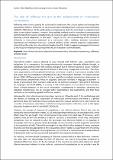Files in this item
The role of reflexive thought in the achievement of intercultural competence
Item metadata
| dc.contributor.author | Matthews, Blair | |
| dc.date.accessioned | 2021-09-11T23:37:38Z | |
| dc.date.available | 2021-09-11T23:37:38Z | |
| dc.date.issued | 2020-03-12 | |
| dc.identifier | 255805046 | |
| dc.identifier | a0e57392-9fa2-4fc3-9bf5-6794a64c01f1 | |
| dc.identifier | 85081754625 | |
| dc.identifier | 000519880200001 | |
| dc.identifier.citation | Matthews , B 2020 , ' The role of reflexive thought in the achievement of intercultural competence ' , Intercultural Education , vol. Latest Articles . https://doi.org/10.1080/14675986.2020.1728093 | en |
| dc.identifier.issn | 1467-5986 | |
| dc.identifier.other | ORCID: /0000-0002-1604-9437/work/71221681 | |
| dc.identifier.uri | https://hdl.handle.net/10023/23952 | |
| dc.description.abstract | Reflexivity refers to the capacity for individuals to understand the cultural system and manage their own position within it. Reflexivity is a key concept in the understanding of intercultural communication (UNESCO, 2006; Blasco, 2012), particularly in recognising the ability for individuals to understand and adapt to new cultural contexts. However, the prevailing methods used in intercultural communication (namely that of intercultural competencies), do not place a great emphasis on the role of reflexivity in achieving cultural adaptation. In this paper, I argue for the central positioning of the concept of reflexivity in intercultural education as a mechanism which mediates between intercultural experiences and individual behaviour. I present evidence of the reflexive sequence (subjectobject-subject) from the reflections of a cohort of students (n=19). Finally, I suggest a pedagogical instrument (a heuristic) for empirically exploring reflexivity in intercultural communication. | |
| dc.format.extent | 237330 | |
| dc.language.iso | eng | |
| dc.relation.ispartof | Intercultural Education | en |
| dc.subject | Intercultural education | en |
| dc.subject | Intercultural competence | en |
| dc.subject | Intercultural communication | en |
| dc.subject | Reflexivity | en |
| dc.subject | Semantic waves | en |
| dc.subject | LB Theory and practice of education | en |
| dc.subject | T-NDAS | en |
| dc.subject.lcc | LB | en |
| dc.title | The role of reflexive thought in the achievement of intercultural competence | en |
| dc.type | Journal article | en |
| dc.contributor.institution | University of St Andrews. International Education Institute | en |
| dc.contributor.institution | University of St Andrews. University of St Andrews | en |
| dc.identifier.doi | https://doi.org/10.1080/14675986.2020.1728093 | |
| dc.description.status | Peer reviewed | en |
| dc.date.embargoedUntil | 2021-09-12 |
This item appears in the following Collection(s)
Items in the St Andrews Research Repository are protected by copyright, with all rights reserved, unless otherwise indicated.

